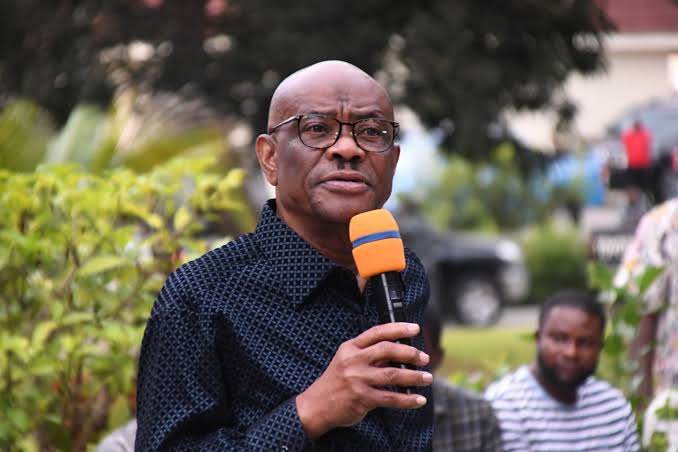Nyesom Wike, the Federal Capital Territory Minister, engaged in a pointed exchange with Peoples Democratic Party (PDP) chieftain, Chief Bode George, during a live media chat in Abuja. The crux of the disagreement stemmed from Wike’s decision to seal the PDP’s National Secretariat due to unpaid ground rent. Wike defended his action, clarifying that neither he nor the party could settle the outstanding dues as the property wasn’t registered under their names. This sparked a rebuttal from George, who attributed Wike’s political prominence to the PDP. Wike retorted, emphasizing his instrumental role in the party’s electoral successes and questioning George’s own contributions to the PDP’s performance in Lagos State.
Wike’s assertion centered on his active involvement in bolstering the PDP’s presence both nationally and within Rivers State. He pointed out that even during the Jonathan administration, despite their efforts, the PDP couldn’t secure control in Lagos. This highlighted a long-standing challenge for the party in a state traditionally dominated by other political forces. Wike’s argument aimed to underscore his commitment to the PDP’s cause, contrasting it with what he perceived as George’s less impactful role, particularly in Lagos. This public disagreement brought to light internal tensions within the PDP and differing perspectives on individual contributions to the party’s trajectory.
The exchange between Wike and George illuminates a broader debate within political parties regarding the relationship between individual efforts and party success. While parties provide platforms for individuals to pursue political ambitions, individual actions, such as campaigning, mobilizing voters, and fundraising, directly impact electoral outcomes. Wike’s stance underscored this dynamic, suggesting that his active engagement contributed significantly to the PDP’s victories, while George’s influence, particularly in Lagos, remained limited. This tension often arises within political organizations, where individuals seek recognition for their efforts, while established figures may downplay the contributions of those they perceive as upstarts.
This specific incident highlights the intricate power dynamics within the PDP and the potential for disagreements to erupt publicly, especially during periods of transition or internal restructuring. Wike’s current position as FCT Minister, while outside the direct party structure, still carries political weight, allowing him to exert influence and voice his opinions on party matters. George, as a long-standing member of the PDP Board of Trustees, represents a more established faction within the party. Their clash underscores the ongoing negotiation of power and influence within the PDP.
Furthermore, the dispute over the unpaid ground rent reveals potential administrative and financial challenges facing the PDP. The inability to settle such dues raises questions about the party’s financial health and internal management. It also points to potential issues with property ownership and registration, which can create legal and operational hurdles. Such logistical and financial matters, while seemingly mundane, can significantly impact a party’s ability to function effectively.
Finally, the media chat itself serves as a platform for politicians to directly address the public and shape their narratives. Wike’s use of this format allowed him to present his version of events and directly respond to criticisms from within his own party. This ability to control the message and engage with the public outside traditional media channels is increasingly important in contemporary politics. The incident also demonstrates the role of media in amplifying internal party disputes and bringing them to the forefront of public discourse. The coverage of this exchange between Wike and George further exposes the internal workings of the PDP and the ongoing tensions between different factions within the party.


